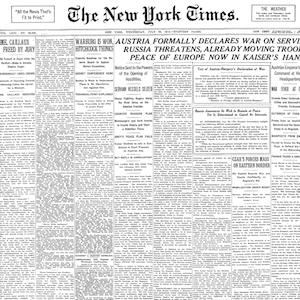The Gray Lady has gotten raunchy in her old age. News has just broken that the New York Times's national security reporter, Ali Watkins, was sleeping with a source who worked as an aide to the Senate Intelligence Committee. That source has now been arrested as part of an investigation into leaks of classified information.
It's long been known that journalism, like the legal profession, attracts its fair share of agenda-driven sleazebags who prioritize half-truths and personal ambition over honor and veracity, perhaps none more so than the New York Times. Back in 2003, Jayson Blair, a reporter for the NYT, resigned because he plagiarized and fabricated stories. Little did we know that the Times's troubles would only grow since then.
Garbage In, Garbage Out
Scientists have a common saying about models: "Garbage in, garbage out." That means if you put bad data into a model, you can fully expect for the model to spit out bad conclusions. The same is true for organizations. If a newspaper hires improperly educated, hyperpartisan people who possess merely a casual relationship with the truth, we can fully expect the newspaper to produce absolute rubbish. And that's exactly what has happened at the New York Times.
Consider the following:
- Just two days ago, a piece in Slate criticized the NYT for its coverage of topics like "wellness" and "detox." The NYT has entire pages dedicated to these wishy-washy topics, which often promote unscientific fad diets and other pseudoscience.
- For years, NYT writers such as Michael Pollan and Mark Bittman, have used their platform to trash biotechnology (e.g., GMOs) and shamelessly promote organic food (as well as sell their books). It's probably not a coincidence that the wife of Arthur Ochs Sulzberger, the former publisher of the Times, sits on the board of Whole Foods.
- After writing a blatantly dishonest piece, journalist Eric Lipton has been sued for defamation by biotech scientist Kevin Folta.
- Journalist Danny Hakim was caught flat-out lying about glyphosate in an NYT article, which he likened to "Nazi-made sarin gas."
- Op-ed writer Nicholas Kristoff regularly fearmongers about chemicals, demonstrating such a fundamental ignorance of basic chemistry and toxicology that he, without a doubt, would flunk an 8th grade science test.
- Economist Paul Krugman, who appears to be suffering from Nobel Disease, implied that President Trump might try to coordinate a 9/11-style attack to legitimize his presidency.
- As I wrote earlier this year, the New York Times has published a long list of other "outlandish articles, such as one that cited Joseph Mercola, an anti-vaxxer and 'cell phone truther' who is the purveyor" of the junk science website Mercola. The NYT also "teach[es] the controversy on post-treatment Lyme disease syndrome," and "claim[s] that sugar is toxic." "Acupuncture? The Times loves it!"
Honestly, this list could go on and on and on. For these reasons, last year, RealClearScience and ACSH ranked various science media outlets, and the New York Times fared poorly. We ranked it as borderline junk science. Yet again, our decision has been vindicated.
Despite all this, the New York Times maintains a high profile and good reputation throughout much of the world. Through its own self-discrediting behavior, that reputation is thoroughly undeserved.




